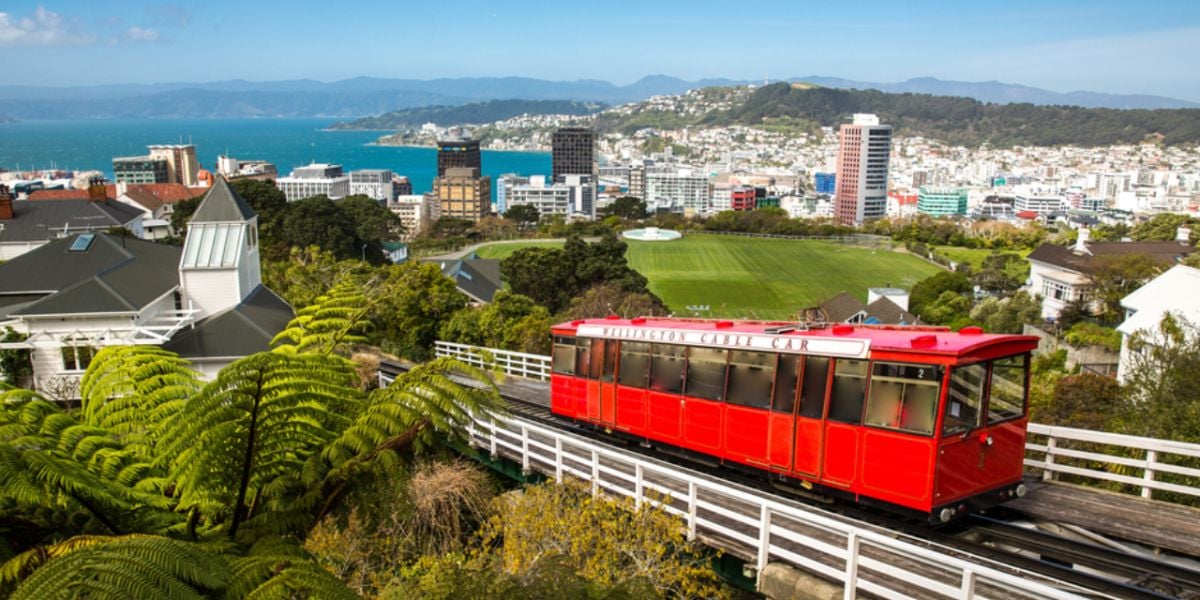
Wellington is the capital of New Zealand. As well as being the seat of the New Zealand Government, it is also home to a wide range of industries, many of which require skilled workers from overseas. The capital is also known for being a great place to head to as an entrepreneur, with plenty of support for self-starters in the city.
As the second-biggest city in New Zealand, Wellington is a great spot to settle down. Besides the government and all of its ministries, there are also a lot of NGOs based in the city.
Wellington is also prominent in New Zealand's film industry. Besides films frequently being shot in the city, Wellington is also the home of special effects studios and various custom-built film sets. Its level of creativity makes it a great place for startups and freelancers, with coworking spaces and support networks available throughout the city.
Tourism is another major industry in Wellington, thanks to the frequency of cruise ships in the area and its ferry links to the South Island. Places like Te Papa and the Beehive attract tourists from both New Zealand and worldwide.
If you are after a well-paid job, Wellington is the place to head. Wages are, on average, NZ$75,000 per year, driven up in part by government and technology jobs. Wellington contributes 12.5% towards the national GDP, so it is a regional powerhouse, second only to Auckland. Wellington also has an unemployment rate of only 3.2%.
Known for its cultural offerings, Wellington has a thriving creative industry and a buzzing cafe and restaurant scene, making it a great city for either working in these industries or just enjoying them – and maybe achieving that harmonious work/life balance we all long for. It's also close to many natural attractions and boasts a beautiful coastline ideal for swimming, hiking, and surfing. Being positioned at the bottom of the North Island, Wellington is perfectly positioned for accessing the attractions of both islands – the South Island is only a half-hour flight away or can be accessed by a picturesque ferry trip to Picton.
People are often drawn to Wellington because it has a lot to offer for its size. Essentially, it has the charms of being accessible and compact while also delivering on the cultural, business, and recreation fronts. It's small – but it has a big personality!
Wellington's economy
Wellington's economy is based on a number of different sectors, including:
- Government and public services: Wellington is home to a large number of government agencies and public service organizations, which are major contributors to the city's economy and provide a lot of professional roles. These include the New Zealand Parliament, the Ministry of Foreign Affairs and Trade, and the Department of Internal Affairs.
- Education and research: Wellington is home to a number of higher education institutions, including Victoria University of Wellington and Massey University, as well as a number of research institutes and centers.
- Information and communication technology (ICT): Wellington is known as New Zealand's "tech capital" and is home to a number of ICT companies, including Xero, Trade Me, and Weta Digital. The ICT sector is a major contributor to the city's economy and is a key driver of innovation and growth.
- Tourism: Wellington is a popular destination for tourists, with attractions such as Te Papa, the Cable Car, and the Zealandia sanctuary. The tourism sector is an important contributor to the city's economy.
- Creative industries: Wellington is home to a vibrant creative scene, with a number of film, television, and music production companies based in the city. The creative industries are a major contributor to the city's economy and are a key part of the city's cultural identity.
Good to know:
Thanks to the location of Wellington, locals like to have a great work-life balance. The harbor is a popular place for sailing and a variety of water sports. Wellingtonians enjoy evenings at Oriental Bay, as well as hikes up Mount Victoria and evenings exploring coffee shops and breweries in Wellington CBD.
Job hunting in Wellington
The experience of job hunting in Wellington will vary based on your area of expertise. If you are beginning the search from overseas and hoping to emigrate with a job offer, consult New Zealand's Green List to see if your area of expertise might be included.
Temp agencies are another great option if you are hoping to land a job very quickly. Consider recruitment agencies if you are looking for work in a particular industry. Besides, there are also plenty of film and entertainment roles available, as well as careers in the tourism industry.
As with job hunting in any city, you have a better chance of success if you approach the task proactively. Here are a few tips that may be helpful when looking for a job in Wellington:
- Research the job market: It's a good idea to research the job market in Wellington before you start your job search. This will give you a better understanding of the types of jobs that are available, the industries that are hiring, and the qualifications and experience that are in demand. Start this process overseas if you can.
- Network: Networking is a great tool for finding job opportunities in Wellington. Consider attending industry events, joining professional organizations, and reaching out to people in your network to let them know that you're looking for a job. If you have any contacts in New Zealand, even if they aren't in your field, it's worth letting them know you're on the hunt – it's a small country, and often unlikely connections can happen based on these kinds of connections.
- Tailor your resume and cover letter: Make sure to tailor your resume and cover letter to the specific job you're applying for. This will help you stand out and show the employer that you have the skills and experience they're looking for.
- Be proactive: Don't be afraid to reach out to potential employers directly, even if they're not advertising a job opening. This can be a great way to get your foot in the door and showcase your skills and experience. Hopefully, they add you to a list of potential employees for the next time they're hiring.
- Use online job search tools: Trade Me, LinkedIn and Seek are excellent tools when looking for jobs in Wellington. These platforms allow you to search for jobs by location, industry, and other criteria and can help you connect with potential employers.
Labor shortages in Wellington
Like many places in the world, New Zealand is currently experiencing labor shortages due to the impact of COVID-19. Border closures, reduced immigration, and changing work culture have contributed to this shortage, and a lot of industries have been impacted. This shortage is possibly most notable in hospitality, where many cafes are short-staffed, operating at reduced hours, or simply closing down for good due to a lack of workers. A quick internet search about labor shortages in New Zealand reveals many news articles calling out for workers. So if you're thinking of moving to New Zealand, this is probably a good time.
Although Covid-19 hasn't been great for the impacted industries, the good news is that New Zealand's borders are now open, and efforts are being made to fill these shortages with overseas workers. Luckily for potential expats, New Zealand recently hugely expanded its Green List, a list put out by Immigration NZ that details the in-demand occupations that qualify for fast-track residence (or have access to a work-to-residence pathway). Going through this list is a great way to determine which skill areas need labor from overseas and whether you might be a good candidate.
If you're curious about shortages in New Zealand, check the Green List frequently, as it is subject to change as the labor market fluctuates. There are currently over 100 roles on the list! Some of the major industries in Wellington (and New Zealand as a whole) that need overseas workers include:
- Hospitality
- Manufacturing
- Agricultural and horticulture
- Engineering and construction
- Healthcare
- Education
Salary expectations in Wellington
When it comes to salary expectations for expats in Wellington, it's hard to give a concrete answer as your salary will depend so much on the industry, job, and your own experience and expertise. New Zealand isn't generally known as somewhere with super high wages, at least compared with other western countries, including Australia, the United States and Western Europe. However, if you are coming from other regions, including the Asia-Pacific, South America, and Eastern Europe, the wages may well be higher than what you are used to. Unfortunately, Wellington does have a pretty high cost of living, so do some research into housing, food, energy, and fuel costs before you move so that you understand how far your wages are going to stretch.
That being said, we can give you a rough breakdown of average annual salaries for some jobs in Wellington. Below is some Wellington-specific data sourced from Payscale that can help you figure out what you might get paid.
- Software Developer - NZ$53,000 - NZ$98,000
- Executive Assistant - NZ$55,000 - NZ$79,000
- Operations Manager - NZ$56,000 - NZ$129,000
- Project Manager - NZ$63,000 - NZ$140,000
- Data Analyst - NZ$53,000 - NZ$89,000
- Accountant -NZ$46,000 - NZ$86,000
- Chief Executive Officer (CEO) - NZ$93,000 - NZ$257,000
The job application and interview process in Wellington
The job application and interview process in Wellington will hopefully not differ too much from what you are used to at home, basically, common sense will get you a long way.
First things first: research. When you apply for a job in Wellington, always research the company and the role well before your interview (not half an hour before!). You can always find some helpful information on the company's website, and if it's a large employer, it may have reviews on Glassdoor. You can also ask current or former employees about their experience working for the organization.
Everything is online. In New Zealand, most job applications are made online, either through the company's website or through job listing websites like TradeMe or Seek. Generally, you will submit your documents as attachments in PDF or a word document form.
Concision is important. When you're putting together your CV and cover letter, keep it concise and highlight your skills. Bullet points are a great way to make your skills stand out. Remember to tailor your application to the specific job you're applying for, and include the names and contact details of referees in your CV or cover letter. New Zealanders tend to prepare CVs that are brief and informative rather than elaborate, so if there is an opportunity for compression, then take it.
Be professional – even if you've heard so much about how casual Kiwis are! When it comes to the interview, practice your answers to some common questions and dress smartly. First impressions are important, so even if your chosen company has a more casual dress code, it's still a good idea to dress professionally for the interview. However, don't be overly formal in your demeanor. Employers really want to get to know you and your personality, so let your enthusiasm for the job shine through.
For more in-depth information, New Zealand has a useful Careers website that has information about salaries, interviews, and the entire job application process in New Zealand. It's geared toward locals, but the information is usually accurate and up to date.
Good to know:
One thing to keep in mind is that your interviewers might not be familiar with a workplace, company, or event that is well-known in your own country. So make sure to include some context in your CV, cover letter, and interview that might help a Kiwi better understand the ins and outs of your employment history.
We do our best to provide accurate and up to date information. However, if you have noticed any inaccuracies in this article, please let us know in the comments section below.








